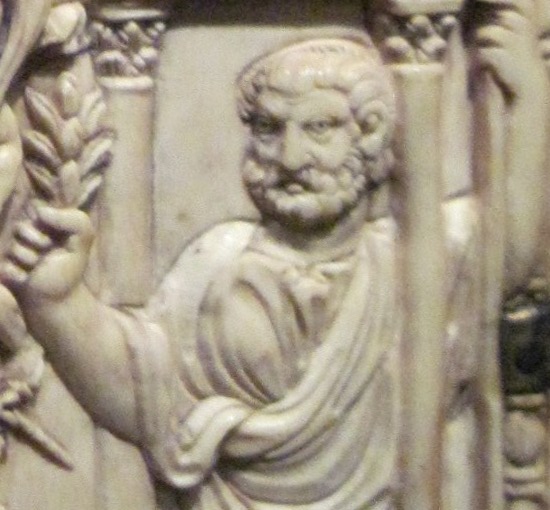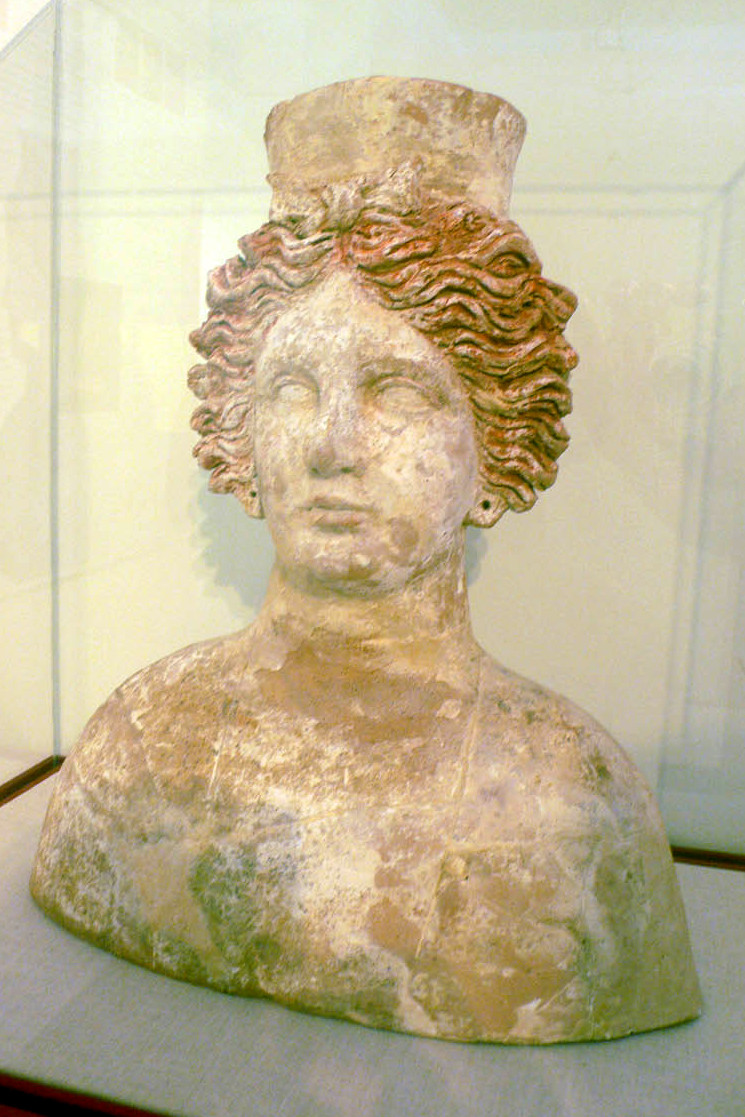|
Asclepiades The Cynic
Asclepiades ( el, Ἀσκληπιάδης; fl. 4th century AD) was a Cynic philosopher. He is mentioned by the emperor Julian whom Asclepiades visited at Antioch in 362. Ammianus Marcellinus describes how Asclepiades accidentally destroyed the temple of Apollo at Daphne in Antioch: The philosopher Asclepiades, whom I have mentioned in the history of Magnentius, when he had come to that suburb from abroad to visit Julian, placed before the lofty feet of the statue a little silver image of the ''Dea Caelestis'', which he always carried with him wherever he went, and after lighting some wax tapers as usual, went away. From these tapers after midnight, when no one could be present to render aid, some flying sparks alighted on the woodwork, which was very old, and the fire, fed by the dry fuel, mounted and burned whatever it could reach, at however great a height it was. The ''Dea Caelestis'' ("Heavenly Goddess") figurine, which Asclepiades always carried with him, was the Roman name f ... [...More Info...] [...Related Items...] OR: [Wikipedia] [Google] [Baidu] |
Cynicism (philosophy)
Cynicism ( grc, κυνισμός) is a school of thought of ancient Greek philosophy as practiced by the Cynics ( grc, Κυνικοί; la, Cynici). For the Cynics, the purpose of life is to live in virtue, in agreement with nature. As reasoning creatures, people can gain happiness by rigorous training and by living in a way which is natural for themselves, rejecting all conventional desires for wealth, power, and fame, and even flouting conventions openly and derisively in public. Instead, they were to lead a simple life free from all possessions. The first philosopher to outline these themes was Antisthenes, who had been a pupil of Socrates in the late 400 BC. He was followed by Diogenes, who lived in a ceramic jar on the streets of Athens. Diogenes took Cynicism to its logical extremes, and came to be seen as the archetypal Cynic philosopher. He was followed by Crates of Thebes, who gave away a large fortune so he could live a life of Cynic poverty in Athens. Cynicism gradua ... [...More Info...] [...Related Items...] OR: [Wikipedia] [Google] [Baidu] |
Carthage
Carthage was the capital city of Ancient Carthage, on the eastern side of the Lake of Tunis in what is now Tunisia. Carthage was one of the most important trading hubs of the Ancient Mediterranean and one of the most affluent cities of the classical world. The city developed from a Canaanite Phoenician colony into the capital of a Punic empire which dominated large parts of the Southwest Mediterranean during the first millennium BC. The legendary Queen Alyssa or Dido, originally from Tyre, is regarded as the founder of the city, though her historicity has been questioned. According to accounts by Timaeus of Tauromenium, she purchased from a local tribe the amount of land that could be covered by an oxhide. As Carthage prospered at home, the polity sent colonists abroad as well as magistrates to rule the colonies. The ancient city was destroyed in the nearly-three year siege of Carthage by the Roman Republic during the Third Punic War in 146 BC and then re-developed as Roman Car ... [...More Info...] [...Related Items...] OR: [Wikipedia] [Google] [Baidu] |
4th-century Philosophers
The 4th century (per the Julian calendar and Anno Domini/Common era) was the time period which lasted from 301 ( CCCI) through 400 ( CD). In the West, the early part of the century was shaped by Constantine the Great, who became the first Roman emperor to adopt Christianity. Gaining sole reign of the empire, he is also noted for re-establishing a single imperial capital, choosing the site of ancient Byzantium in 330 (over the current capitals, which had effectively been changed by Diocletian's reforms to Milan in the West, and Nicomedeia in the East) to build the city soon called Nova Roma (New Rome); it was later renamed Constantinople in his honor. The last emperor to control both the eastern and western halves of the empire was Theodosius I. As the century progressed after his death, it became increasingly apparent that the empire had changed in many ways since the time of Augustus. The two emperor system originally established by Diocletian in the previous century fell in ... [...More Info...] [...Related Items...] OR: [Wikipedia] [Google] [Baidu] |
Udder
An udder is an organ formed of two or four mammary glands on the females of dairy animals and ruminants such as cattle, goats, and sheep. An udder is equivalent to the breast in primates and elephantine pachyderms. The udder is a single mass hanging beneath the animal, consisting of pairs of mammary glands with protruding teats. In cattle and camels, there are normally two pairs, in sheep, goats and deer, there is one pair, and in some animals, there are many pairs. In animals with udders, the mammary glands develop on the milk line near the groin, and mammary glands that develop on the chest (such as in humans and apes and elephants) are generally referred to as breasts. Udder care and hygiene in cows is important in milking, aiding uninterrupted and untainted milk production, and preventing mastitis. Products exist to soothe the chapped skin of the udder. This helps prevent bacterial infection, and reduces irritation during milking by the cups, and so the cow is less likely to ... [...More Info...] [...Related Items...] OR: [Wikipedia] [Google] [Baidu] |
Milk
Milk is a white liquid food produced by the mammary glands of mammals. It is the primary source of nutrition for young mammals (including breastfed human infants) before they are able to digestion, digest solid food. Immune factors and immune-modulating components in milk contribute to milk immunity. Early-lactation milk, which is called colostrum, contains antibody, antibodies that strengthen the immune system, and thus reduces the risk of many diseases. Milk contains many nutrients, including protein and lactose. As an agricultural product, dairy milk is Milking, collected from farm animals. In 2011, Dairy farming, dairy farms produced around of milk from 260 million dairy cows. India is the world's largest producer of milk and the leading exporter of skimmed milk powder, but it exports few other milk products. Because there is an ever-increasing demand for dairy products within India, it could eventually become a net importer of dairy products. New Zealand, Germany and the ... [...More Info...] [...Related Items...] OR: [Wikipedia] [Google] [Baidu] |
Tertullian
Tertullian (; la, Quintus Septimius Florens Tertullianus; 155 AD – 220 AD) was a prolific early Christian author from Carthage in the Roman province of Africa. He was the first Christian author to produce an extensive corpus of Latin Christian literature. He was an early Christian apologist and a polemicist against heresy, including contemporary Christian Gnosticism. Tertullian has been called "the father of Latin Christianity" and "the founder of Western theology". Tertullian originated new theological concepts and advanced the development of early Church doctrine. He is perhaps most famous for being the first writer in Latin known to use the term ''trinity'' (Latin: ''trinitas''). Tertullian was never recognized as a saint by the Eastern or Western Catholic churches. Several of his teachings on issues such as the clear subordination of the Son and Spirit to the Father, as well as his condemnation of remarriage for widows and of fleeing from persecution, contr ... [...More Info...] [...Related Items...] OR: [Wikipedia] [Google] [Baidu] |
Quintus Aurelius Symmachus
Quintus Aurelius Symmachus signo Eusebius (, ; c. 345 – 402) was a Roman statesman, orator, and man of letters. He held the offices of governor of proconsular Africa in 373, urban prefect of Rome in 384 and 385, and consul in 391. Symmachus sought to preserve the traditional religions of Rome at a time when the aristocracy was converting to Christianity, and led an unsuccessful delegation of protest against Emperor Gratian's order to remove the Altar of Victory from the curia, the principal meeting place of the Roman Senate in the Forum Romanum. Two years later he made a famous appeal to Gratian's successor, Valentinian II, in a dispatch that was rebutted by Ambrose, the bishop of Milan. Symmachus's career was temporarily derailed when he supported the short-lived usurper Magnus Maximus, but he was rehabilitated and three years later appointed consul. After the death of Theodosius I, he became an ally of Stilicho, the guardian of emperor Honorius. In collaboration with Sti ... [...More Info...] [...Related Items...] OR: [Wikipedia] [Google] [Baidu] |
Patron Goddess
A tutelary () (also tutelar) is a deity or a spirit who is a guardian, patron, or protector of a particular place, geographic feature, person, lineage, nation, culture, or occupation. The etymology of "tutelary" expresses the concept of safety and thus of guardianship. In late Greek and Roman religion, one type of tutelary deity, the ''genius'', functions as the personal deity or ''daimon'' of an individual from birth to death. Another form of personal tutelary spirit is the familiar spirit of European folklore. Ancient Greece Socrates spoke of hearing the voice of his personal spirit or ''daimonion'': The Greeks also thought deities guarded specific places: for instance, Athena was the patron goddess of the city of Athens. Ancient Rome Tutelary deities who guard and preserve a place or a person are fundamental to ancient Roman religion. The tutelary deity of a man was his Genius, that of a woman her Juno. In the Imperial era, the Genius of the Emperor was a focus of Imperia ... [...More Info...] [...Related Items...] OR: [Wikipedia] [Google] [Baidu] |
Julian The Apostate
Julian ( la, Flavius Claudius Julianus; grc-gre, Ἰουλιανός ; 331 – 26 June 363) was Roman emperor from 361 to 363, as well as a notable philosopher and author in Greek. His rejection of Christianity, and his promotion of Neoplatonic Hellenism in its place, caused him to be remembered as Julian the Apostate in Christian tradition. A nephew of Constantine, Julian was one of few in the imperial family to survive the purges and civil wars during the reign of Constantius II, his cousin. Julian became an orphan as a child after his father was executed in 337, and spent much of his life under Constantius's close supervision.''Oxford Dictionary of Late Antiquity'', "Julian the Apostate", p. 839 However, the emperor allowed Julian to freely pursue an education in the Greek-speaking east, with the result that Julian became unusually cultured for an emperor of his time. In 355, Constantius II summoned Julian to court and appointed him to rule Gaul. Despite his inexperience, ... [...More Info...] [...Related Items...] OR: [Wikipedia] [Google] [Baidu] |
Tanit
Tanit ( Punic: 𐤕𐤍𐤕 ''Tīnīt'') was a Punic goddess. She was the chief deity of Carthage alongside her consort Baal-Hamon. Tanit is also called Tinnit. The name appears to have originated in Carthage (modern day Tunisia), though it does not appear in local theophorous names. She was equivalent to the war goddess Astarte, and later worshipped in Roman Carthage in her Romanized form as Dea Caelestis, Juno Caelestis, or simply Caelestis. In modern-day Tunisian Arabic, it is customary to invoke or ('Mother Tannou' or 'Mother Tangou', depending on the region), in years of drought to bring rain. Similarly, Algerian, Tunisian and many other spoken forms of Arabic refer to " farming" to refer to non-irrigated agriculture. Such usage is attested in Hebrew, a Canaanite language sister to Phoenician, already in the 2nd century CE Mishnah. Tanit or Tinnīt? Until 1955 the name of the goddess was only known in Phoenician characters, as TNT (written without vowels). It wa ... [...More Info...] [...Related Items...] OR: [Wikipedia] [Google] [Baidu] |
John Carew Rolfe
John Carew Rolfe, Ph.D. (October 15, 1859 in Newburyport, Massachusetts – March 26, 1943) was an Americans, American classical scholar, the son of William James Rolfe, William J. Rolfe. Rolfe graduated from Harvard University in 1881 and from Cornell University (Ph.D.) in 1885. Rolfe taught at Cornell University, Cornell (1882–1885), at Harvard University, Harvard (1889–1890), at the University of Michigan, and at the University of Pennsylvania. Rolfe was a professor from 1907–1908 at the American School of Classical Studies and at the American Academy in Rome from 1923–1924. He continued to serve at the Academy until 1940. In 1910–1911, he was List of Presidents of the American Philological Association, president of the American Philological Association. Rolfe translated many Latin authors, especially historians, for the Loeb Classical Library: Ammianus Marcellinus, Cornelius Nepos, Aulus Gellius, Quintus Curtius, Sallust, and Suetonius. See also *Telegenius ... [...More Info...] [...Related Items...] OR: [Wikipedia] [Google] [Baidu] |




.jpg)




